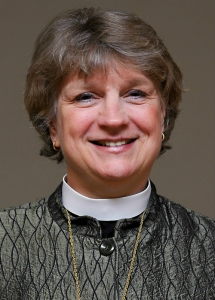 By Bishop Ann Svennungsen
By Bishop Ann Svennungsen
What a blessing it was to attend the 2019 Churchwide Assembly in Milwaukee!
We worked hard on the decisions facing our church; we worshiped and studied scripture together; we celebrated and communed with people across the ELCA and around the globe. I will not soon forget the long procession during Friday’s worship of female pastors who until 50 years ago could not have been ordained.
I encourage you to become acquainted with a summary of the important actions taken in Milwaukee. I wish to write about one particular decision – something that’s garnered lots of public attention: In its plenary on August 6, the assembly voted to declare the ELCA a sanctuary church body.
Though the vote was clear, our understanding of what becoming a sanctuary denomination is not as clear. In fact, the resolution included an amendment specifically asking the church council to provide guidance about what this means.
In my heart and mind, I believe the action was taken as a way to respond to our great sorrow around what feels like unprecedented threats facing refugees and undocumented immigrants in our country:
- ICE raids in Mississippi leaving hundreds of children separated from parents and guardians, awaiting pick-ups from schools or day care centers or returning to empty homes.
- Alarming reports of negligence, abuse, and deaths of migrant children in U.S. detention facilities.
- Rumors of federal proposals that will reduce the quota of visas from 30,000 this year to zero in 2020 for those seeking refugee resettlement status. Lutheran Immigration and Refugee Services offers a helpful explanation.
One might say that the ELCA decision to become a sanctuary denomination is largely symbolic. Nothing in the action binds synods or congregations. It doesn’t require congregations or individuals to engage in any particular action. Primarily, I see the resolution as a way to “go on record,” challenging the brokenness and injustices we see in our immigration system. And it’s part of the Lutheran story in America.
Our church has a long history of both helping refugees and working for just and generous immigration policies. We believe our country has a calling to welcome our fair share of refugees and to welcome them to the U.S. without discrimination based on race, religion, or national origin.
I invite you to read the entire sanctuary church body resolution, which also calls us to:
- Reaffirm the long-term and growing commitment of this church to migrants and refugees and to the policy questions involved, as exemplified most recently in the comprehensive strategy Accompanying Migrant Minors with Prot ection, Advocacy, Representation and Opportunities (AMMPARO).
- Develop a plan for additional tools that provide for education and discernment around sanctuary. (some of our synod’s congregations have discerned a call to provide resources and/or housing to those fearing deportation; they would welcome conversation with other congregations exploring such a calling).
The 145 congregations in our synod are amazingly diverse in how they will receive this action by the churchwide assembly. As you reflect on this decision, please keep in prayer all those who are anxious about deportation – members of our congregations and communities.
And, please also pray that the Spirit will guide us — individuals and congregations — as we seek to faithfully love the neighbor and the stranger in our midst.

